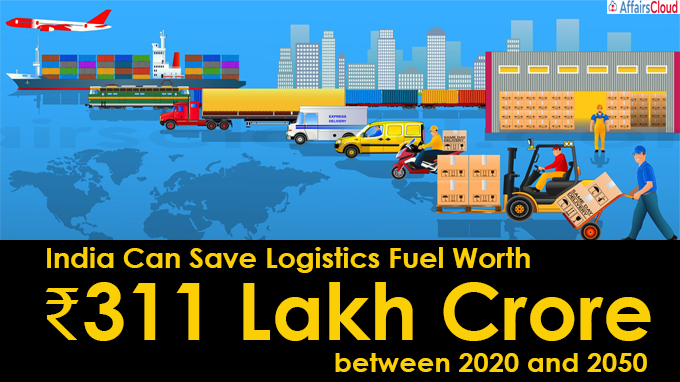 NITI Aayog (National Institution for Transforming India), RMI (Rocky Mountain Institute), and RMI India presented key opportunities for India to reduce its logistics costs through their new report, titled ‘Fast Tracking Freight in India: A Roadmap for Clean and Cost-Effective Goods Transport’.
NITI Aayog (National Institution for Transforming India), RMI (Rocky Mountain Institute), and RMI India presented key opportunities for India to reduce its logistics costs through their new report, titled ‘Fast Tracking Freight in India: A Roadmap for Clean and Cost-Effective Goods Transport’.
- Clay Stranger, Managing Director, RMI mentioned the need for the transformation of the freight sector as it will enable India to save logistics Fuel worth Rs 311 lakh crore between 2020 and 2050.
- Freight transport: It is the physical process of transporting commodities and merchandise goods and cargo.
- Logistics costs: They are the summation of all expenditures undertaken to make a good or service to be available at the market (mainly the end consumer). Transportation costs are the dominant consideration of logistic costs.
Key points of the report:
i.The report stated about India’s potential to,
- Reduce the country’s logistics cost by 4 percent of GDP (Gross Domestic Product).
- Achieve 10 gigatonnes of cumulative CO2 emissions savings between 2020 and 2050.
- Reduce nitrogen oxide (NOx) and particulate matter (PM) emissions by 35 percent and 28 percent, respectively, until 2050.
ii.The report also defined solutions for the freight sector related to policy, technology, market, business models and infrastructure development.
iii.The recommendations of the report include increasing the rail network’s capacity, promoting intermodal transport, improving warehousing and trucking practices, policy measures and pilot projects for clean technology adoption, and stricter fuel economy standards.
iv.The report noted the need for whole system transformation of the freight sector, as India’s freight activity will grow five-fold by 2050 and about 400 million citizens might move to cities.
v.As per the report, currently, India is handling 4.6 billion tonnes of goods each year, amounting to a total annual cost of Rs 9.5 lakh crore (trillion).
Current Scenario:
i.Freight transport was an essential one to economic development but it has been affected by high logistics costs and also contributes to rising CO2 emissions and air pollution in cities.
ii.Due to the rising demand for goods and services, freight transport demand is expected to grow rapidly in the future.
Recent Related News:
HOPE Consortium’s first-ever World Immunisation & Logistics Summit 2021 held in Abu Dhabi, United Arab Emirates. Dr. Harsh Vardhan, Union Minister for Health and Family Welfare of India virtually participated in a final panel discussion on ‘Focus on Asia: Vaccine production and distribution across Asia’.
About NITI Aayog:
Establishment – January 1, 2015, under the resolution of the Union Cabinet.
Headquarters – New Delhi
Chairperson– Prime Minister (Current – Narendra Modi)
CEO– Amitabh Kant
About Rocky Mountain Institute (RMI) India:
RMI India is working with NITI Aayog, on thought leadership for clean energy and mobility transformation.
Establishment – 2019
Headquarters – New Delhi
Manager – Jagabanta Ningthoujam
About Rocky Mountain Institute (RMI):
Establishment – 1982
Headquarters – Basalt, Colorado
Manager – Lynn Daniels




